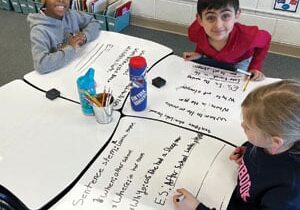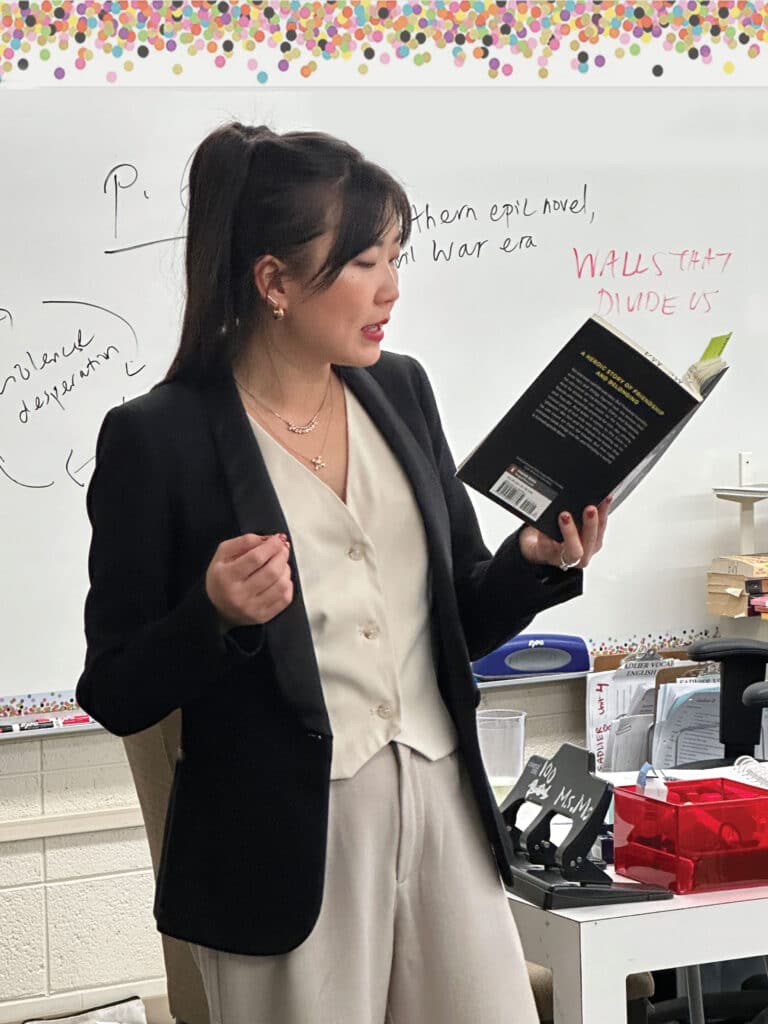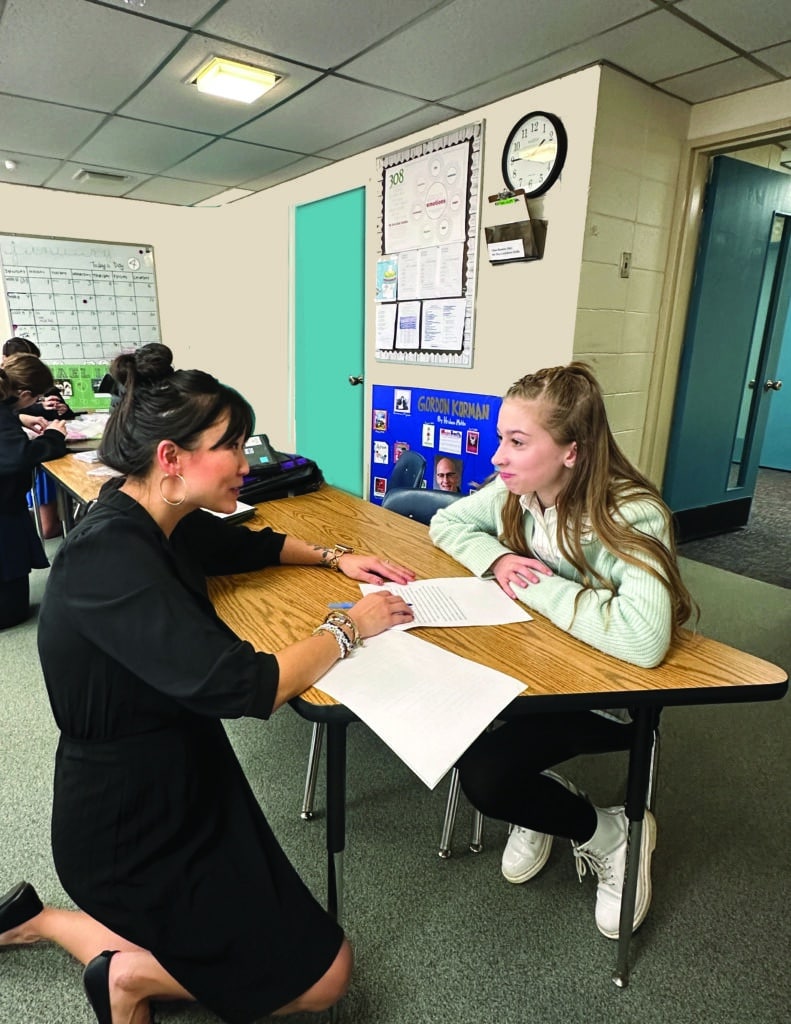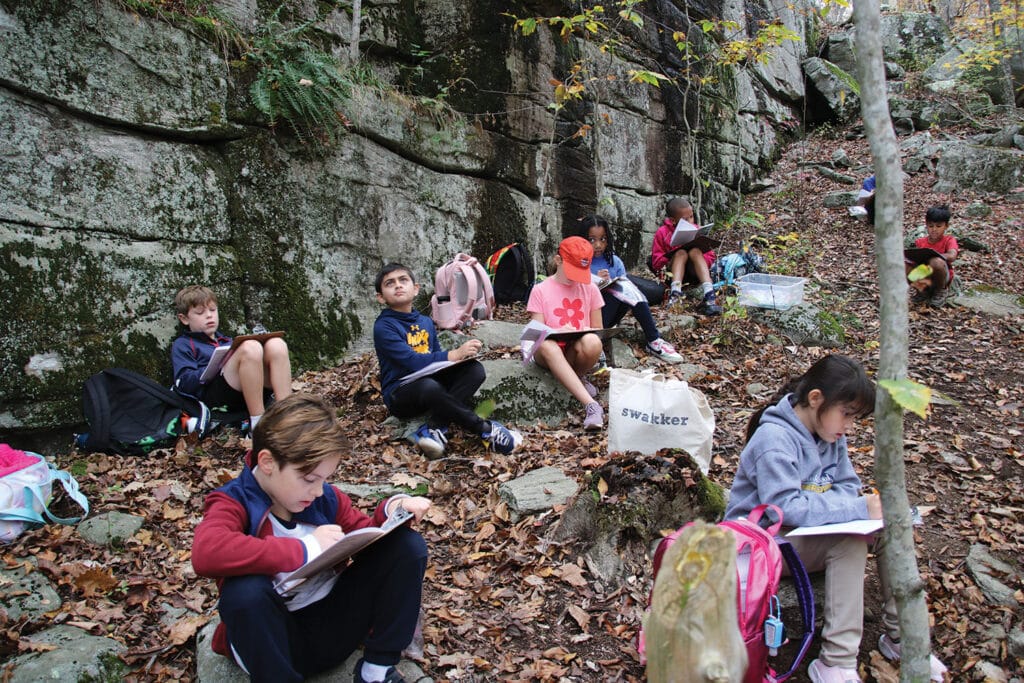Writing from Beginning to End

A Snapshot of Renbrook’s Writing Program Initiatives
By Amy Ma, Director of Writing; English Department Head; Co-Coordinator of Diversity and Belonging

“I wrote my way out – Wrote everything down far as I could see
I wrote my way out – I looked up and the town had its eyes on me
Wait for it … (I’ll write my way out)
Wait for it … (Write everything down, far as I can see)
Wait for it … wait (History has its eyes on you)
I’ll write my way out – Overwhelm them with honesty
This is the eye of the hurricane, this is the only
Way I can protect my legacy
Wait for it …. Wait …”
-Lin-Manuel Miranda, “Hurricane” from Hamilton: An American Musical
Fostering a Love of Reading
Fostering a love of reading is a fundamental goal of a Renbrook education. Alumni will reel off the titles of books their teachers nudged them to read and the impact those books had on them. Carrying an independent reading book around in one’s backpack, right alongside a laptop, is a Renbrook tradition that we hope will never die.
Take Flight Read-A-Thon
This fall, Renbrook students seized the challenge presented by the Take Flight Read-A-Thon, gobbling up books and raising money with gusto. 207 students logged 72,676 minutes of reading over two weeks. The money they raised—a grand total of $30,729—is their donation toward the new Library Learning Commons, and they are proud of it!
The Read-A-Thon wrapped up with a celebratory all-school assembly as readers of all ages cheered their accomplishment. These young donors will be able to take credit for the marvelous new Library Learning Commons they helped to design and fund.
In a classic episode of The Twilight Zone, we watch with dread as a solitary book lover has at long last endless time to read his adored stories in the desolation of some catastrophic event that has decimated the rest of the world’s population. After the initial shock, he rejoices that, finally, he is left with the books he holds so dear – only to break his glasses and find himself friendless and utterly alone, with no chance of reading, or of anyone reading to him – ever again.
In exuberant contrast with this dark image, let us now shift the gears of time and space to a panoramic view of our Renbrook campus: the opposite of lifeless isolation, a busy mountaintop academic microcosm, rich with the clamor of young voices and the industrious thrum of constant learning. Chief among our academic beliefs here is the idea that strong, clear thinking is strong, clear writing, and vice versa. The indispensable skill of excellent writing has long been a core value of our philosophy. Direct, scaffolded instruction of foundational skills and bold exploration in the teaching of writing have always been the keystone of Renbrook’s curriculum. Unlike the isolated Twilight Zone book lover, our students know that there is a receptive audience for their thoughts. Their essential writing skills are built moment by moment, in the context of engaging, meaningful content. Writing is a crucial skill that enables our young people to tap into their why; this is a cornerstone of how we “bring learning to life.”
Defining, Reinforcing, and Enhancing
In recent years, we have increased our efforts to define, reinforce, and enhance our writing instruction. The shock of the COVID era reinvigorated our belief that skillful writing empowers and steadies our students in their academic journeys. Together, the Board, division heads, and faculty are committed to further developing our writing program. With the introduction of a new role, Director of Writing K-8, in the summer of 2022, we set forth to share and analyze our best practices, identify areas for growth, and create a comprehensive overview of our mission for the teaching of writing.

Reconceiving our Writing Program
To date, we have created a new mission/philosophy statement which outlines key tenets and features of our writing program. We have drafted prototypes of resources such as a chronological scope and sequence flip chart that teachers can easily reference in their planning and evaluation. We have provided teachers with codified language and information to use both as instructors and as advisors, and we have begun work on cross-divisional templates and tools to aid in effective instruction. We launched applicable initiatives (based on the core tenets we identified) to employ in our day-to-day teaching. These include rigorous instruction in sentence construction (as the sentence is the foundational building block of all writing), increasing high-volume, low-stakes writing in all classes, unifying faculty in identifying as competent teachers of writing, and presenting our work to stakeholders at Board, parent, and school-wide meetings.
In the first stages of reconceiving the writing program, Upper School faculty worked together to identify our most effective practices, projects, and curricular mapping objectives. With the support of the Director of Writing, teachers then began to outline a more comprehensive scope and sequence of what skills are taught and when, how they are enriched through developmental stages, and how to best communicate what we all teach.
Through this rigorous engagement around how we teach writing, some key tenets emerged organically. We know that in order to produce passionate, original thinkers and writers, we must establish the fundamental skills of the writing process in sequence, through the lens of compelling content, and we must work to build students’ confidence and resilience in this process. We value critical thinking over achievement metrics and process over product, and we strive to instill these ideas in our students. Our goal is to work as a collective of teachers of writing, across divisions, departments, content areas, and disciplines.
This year, we will move our focus to the Lower School, engaging the same collaborative process. Communication and collaboration about what, how, and when we teach writing skills are paramount in strengthening our program. We aim to establish solid cohesion between the Lower and Upper Schools, so that all teachers have common student-centered language, information, and tools to elevate their practice in pursuit of the vision of a Renbrook graduate as writer. Our goals for the future are to continue to develop consistency and innovation; to create more opportunities to showcase student writing by reinvigorating traditional student publications and adding website content; to provide more professional development; and to build a Writers’ Workshop in our reimagined library.

When we teach students to write with power, clarity, and confidence, we help them to believe that they matter. What they think and how they got there matter; how they choose to record their ideas and their lived experience matters. If they can harness the combination of passion and precision, employ the skills they master each year, and take risks, they will own their learning in powerful ways. After all, from great risks come some of our most beautiful speeches, lyrics, novels, scientific hypotheses, and calls to action. Mistakes and missteps will be made, and not every act of creation yields our best work, but every step forward builds the engine of thought.
We live in dizzyingly fast-paced times, constantly surrounded by information. We are living alongside robots who can do more, faster, using less energy and fewer resources. The robots can mimic, can produce, can order and re-order, can edit, can rhyme, can echo, can chat.
The Heart of Writing
The right words and the right constructs matter—but so does the mind. So does the heart. Robots can produce, but they cannot think. They cannot feel. They do not know the urgency that we know: the sure conviction that we must continue learning, we must continue thinking, we must record our thinking for the common good of all. In fostering a community of writers, not only do we further progress, but we may be nurturing the next creative phenomenon, who will in turn encourage another, and so forth.
In summation, the Renbrook writing program is a unified, cohesive approach to the teaching of writing that begins with our earliest learners and culminates with the sophisticated young people we celebrate at Commencement. Our program is built on our shared mission, vision, and tenets, through which we teach students mastery of fundamental skills through immersive content. The mission itself is to guide our youngest thinkers to harness and wield the power of their thinking with clarity, conscience, and discipline. It is to raise citizens who never stop questioning.
Yet the robots cannot live as children live; they cannot feel the indignant pang of disagreeing with a classmate. They cannot feel the flush and fluster of the productive struggle to find the right words with which to vanquish one’s intellectual adversary with civility and respect. They cannot know the indescribable thrill of seeing their own words in print, sharing them out loud, watching the faces of an audience of fellow learners, and hearing families and teachers exclaim, “You wrote that? I am so proud of you!”
At school, we are a community of thinkers and writers, compelled to share our ideas and to serve as audience, ally, and challenger for one another. We will not be alone with our thoughts in some twilight zone of prefabricated ideas. Artificial intelligence and its glib turns of phrase do not feel the rush of the blood in the veins that comes with sudden understanding, or a heartbreak, the sheer joy and tumult of connection with the self, because it does not have a self. Our young thinkers, however, are constantly charged with the personal, the political, the emotional, and the analytical. When students are strong writers, they tap into their highest levels of discovery. Indolence, apathy, and complacency are disrupted when we write well. School is a sacred space in which we strive to uphold wholesome values, whole-heartedly. And in the final analysis, school is the societal hub, the hive, the home base of human hearts and minds at work: wondering, thinking, feeling, loving, losing, recording, and bringing thought to roaring, indomitable life.